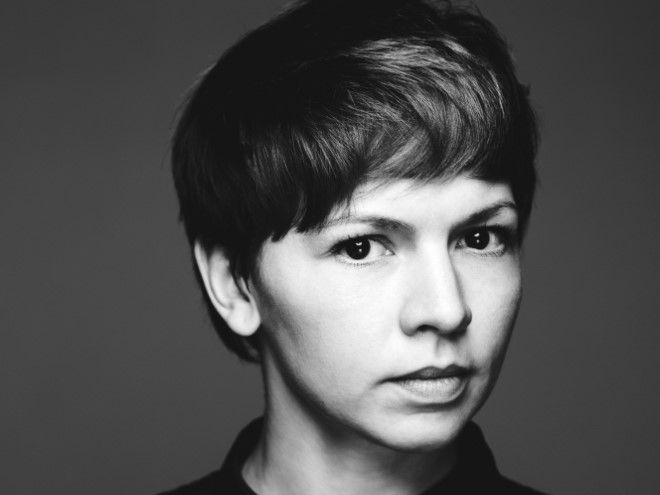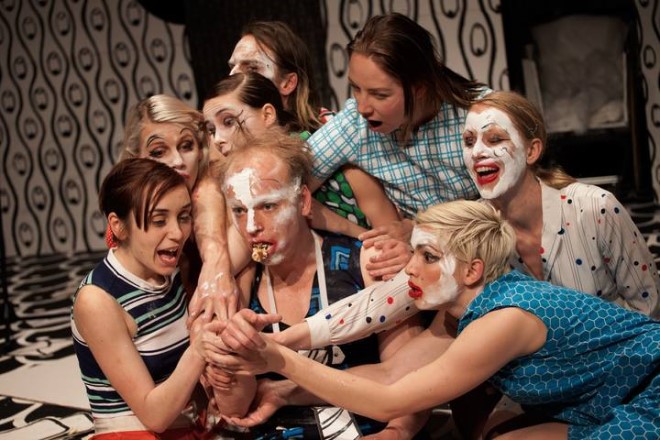
Why did you choose to apply for the bachelor program in acting at Norwegian Theatre Academy (NTA)?
- I was looking for a place where I could dive into the skills and crafts necessary to be a confident performer, and at the same time a place where I could learn how to structure my own ideas, create and develop my own work and voice. Looking back I guess I was also looking for a community, a place to belong artistically and to see myself and my own ideas and questions in relation to others. I think I wrote in my application letter that I was looking for freedom and magic. I think all off the above still applies to how I experienced NTA.
How did you learn about NTA?
- I went to see work made by former students and so I started slowly circling in on the school and talking to friends who were studying there. I also went to visit the school the year before I applied, and by then I was 25. For me personally I am glad I had done some other studies and work before starting the education, but this isn’t necessarily the same for everybody.
Would you like to aplly? Application deadline is March 1. Find more information.
How did you experience being an acting student at NTA?
- I had a great time at NTA, for me it was a dream scenario to be able to focus on the things I love the most for three full years and NTA was the ideal place to do it. It is a very important place that I care about.
The school requires a high level of engagement and interest, and naturally attracts hard working and motivated students. There is great energy when a group of people is pulling towards something together, but it can also be very hard when things don’t run smoothly – so I’m not trying to paint a pretty perfect picture, that would be boring. There are lots of important obstacles and confusing moments. However, the reason you are there in the first place is so that you can take risks and end up in these situations.

Evaluation, interdisciplinary collaboration and a constructive dialogue is strongly encouraged and this is crucial, especially when projects are demanding, time and energy wise. On the other hand, how to work is also up for negotiation, and within the frames of the different projects there can be freedom. The students are given a lot of responsibility to develop constellations, methods, manifestos and work ethics. The premises and technical department offers the necessary pragmatic frame for the projects. Because of this the students are well prepared when communicating with institutions after graduation, as creators or performers.
Being exposed to so many different ways of working from guest-artist and ways to think and talk about art and society is priceless. Instead of following only one trajectory you are encouraged to find your own.
Marina Popivic, NTA alumni
- Socially you become close with your fellow students, as it is a small school in a small town. You spend a lot of time at school also outside of class, as you probably need to prepare, rehearse or organize something, so there are many weekends, parties, common meals and hours spent together. Bigger cities like Oslo and Gothenburg are not far away if you need a break or other input.
Can you describe the international profile of NTA – from a student perspective?
- It is one of the aspects which makes the school so unique, you get to engage with the whole world and not only as a visitor or as part of an exchange (which is also a possibility), but you get to work and share your meals closely with people on a day-to-day basis for a long period of time. It makes global challenges more pressing because they relate to you and your friends and colleagues. It also raises questions of privilege and responsibility, how we take care of each other and what stories are being told when we, due to our passports, visas and backgrounds have different access to commodities.
This learning environment is a much-needed counterpoint to the current political discourses and polemics, and the exclusionist policies following them. We need a multitude of voices.
It also opens up for other traditions within the performing arts and different networks than you are used to. Many former students go abroad to work or even collaborate with artists they’ve met at the school.
What is you work experience since graduating from NTA?
- Since graduating in 2016 I have continued working closely with fellow student from the scenography department, Freya Sif Hestnes. During our studies we made the performance There is a Noise that was picked up by several festivals and we have now performed it across Europe, India and will continue touring next year. The Arts Councils in Denmark and Norway have granted us funding for our next project, which we will be premiering at Teater Avant Garden in Trondheim in 2019.In the Hestnes / Popovic constellation we are both performing, creating and producing and the interdisciplinary approach which we carry from NTA is very present in our work.
I’ve also been touring internationally with New International Encounter (NIE) with the performance We come from Far, Far Away and with Flaatenbjørk Kompani with the performance Kandisia. Both of these ”gigs” straight after graduation came from the communities and connections made through NTA (Flaatenbjørk is an NTA alumni and the artistic director of NIE, Kjell Moberg, was also running the theatre across the street from NTA for a while). I also acted in the tv-series Grenseland / Borderliner (Tv2/Netflix) and Heimebane (NRK) which was a lot of fun. While studying I contacted theatres that had interesting artistic visions and where I felt that there were risks being taken. This led to being invited to audition for my current job, which is a full time position at the regional theatre Teater Ibsen in Skien.
As an alumni, how are the things you learned at NTA useful to you?
- Oh, that’s a huge question! I feel like I engage with what I learned at NTA all the time. It can be very specific technical skills related to voice, body or breath. Other times it is remembering to ask others and myself hard questions, tune in to my own intuition or managing and leading projects. Although I worried like crazy about everything that had to do with life after studying, paying bills and such, I left NTA feeling confident and unafraid.
I appreciate a lot the reflection and responsibility that was encouraged. This made me aware of how I learn and how I need to build and nurture my own artistic practice, which in turn helps me understand what works for me, what works for others and how these things can work together. This is endlessly important, because some people think with their bodies, or voices, others have an emotional or psychological approach to work or talk within specific references and traditions. There is no method that is objectively better than another, but they have different purposes for different projects and to be able to identify this has been specifically useful.
Also, because critical thinking is such a big part of the education, it becomes a reflex, and one I am very grateful for to be able to articulate. I think it is common amongst NTA`ers to stir things up a bit and enter into critical dialogue wherever they are, often through playful strategies.
What I miss the most from NTA and which is hard to find out here while juggling different projects and constellations, is the continuous guidance one could find amongst the faculty, it felt safe to have a door to knock on.
On the other hand there is a big community consisting of alumni, and when in doubt, I call my peers and ask them for advice. There is a lot of hard work being done right now to formalize this Alumni community as an organization and to have it as a more accessible and a more structured way of exchanging experience and artistic practice. So stay tuned for upcoming workshops and meetings!
Why would you recommend others to apply for this study programme?
Yes, I wish I could sum it all up better, but I recommend it to anyone who is willing to fail, fall, stumble, take risks and have serious fun while they do it. It is a solid base for your mind and body and a thrilling arts education. Just go there and see.